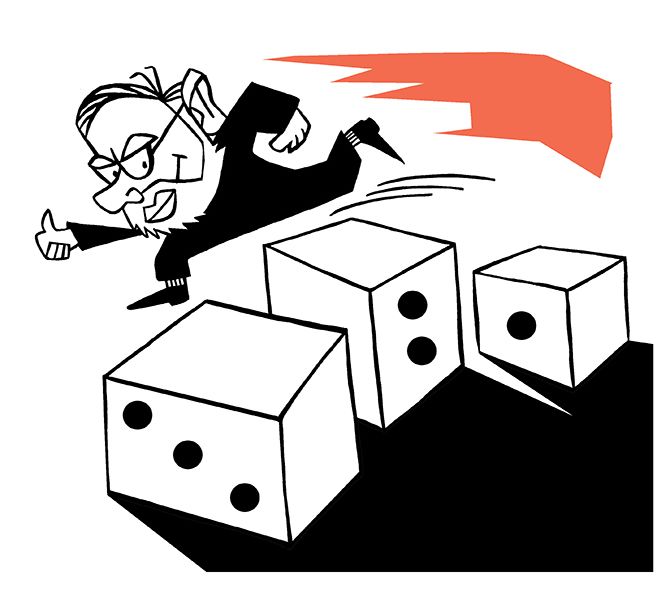'We are moving away from the Modi promise of less government,' says T N Ninan.
Illustration: Uttam Ghosh/Rediff.com

What has received less attention is the sub-text of the announcement, pointing as it does to bigger government -- a trend that is already evident in other spheres.
Basically, we are moving away from the Modi promise of less government.
The manner in which the banks are to be recapitalised will mean a government outlay (most of it from borrowed funds) of over Rs 1.5 lakh crore, split over two years.
If the sum is split evenly, the fiscal deficit this year will go up by about 0.4% of gross domestic product.
This will come on top of the expected shortfall in non-tax revenues so that the year's deficit could inch up to about 4% of GDP -- a slide back from last year's 3.5%, instead of being a move forward to 3.2%.
It will also raise the ratio of government debt to GDP -- which the N K Singh committee has said is already too high.
There is a price being paid for recapitalising the government's banks.
Recapitalisation in the manner announced will also raise the level of government ownership in banks, instead of bringing it down as has been the intention.
More than 70% of the fresh capital to be pumped in is to come from the government whereas in many banks the extent of government shareholding has slipped to well below that level.
Yashwant Sinha is not this government's favourite person, but it is worth recalling that, as finance minister in the Vajpayee government, he had talked of bringing down government shareholding in banks to 33%.
This fits into the pattern set by other developments -- like the public share issue by the General Insurance Corporation. The offer of shares got a poor response from the retail investing public.
Among institutional investors, the biggest investors were other government-owned entities, chief among them being the Life Insurance Corporation. The list also featured some government banks.
This looks suspiciously like those supposedly banned 'phone calls' from North Block having been made to prod government-owned entities to bail out a public sector issue.
Since the price of the new shares fell immediately on listing, all investors have lost value at the moment.
As the saying goes, the more things change, the more they stay the same.
The pattern of an expanding rather than contracting role for the government extends to new price controls in sectors like pharmaceuticals and the ways in which the Aadhaar number is being used to facilitate a surveillance society, even as a dithering Supreme Court ties itself in knots when questions are posed to it.
Meanwhile, on account of past experience, the private sector's role in infrastructure creation has become more circumspect even as expanding the role of the private sector in areas like defence production has made little progress.
Nor is the promise of less government more likely under another regime.
The Congress offensive is inevitably from the Left, not the Right. This is to be expected, given its long history as a left-of-centre party and its populist heritage.
But please note that its embrace of the leaders of the Patidar agitation must signal a willingness to consider expanding still further the community list for reservations in educational institutions and government establishments.
As a closing thought, all those who quarrel with what they see as the fetish made of GDP growth should ponder how much today's political responses are driven by the pressures that flow from slowing growth and lack of jobs, and how much more room there would be for pro-market policies as well as for welfare measures if the economy were doing better on the growth front.











